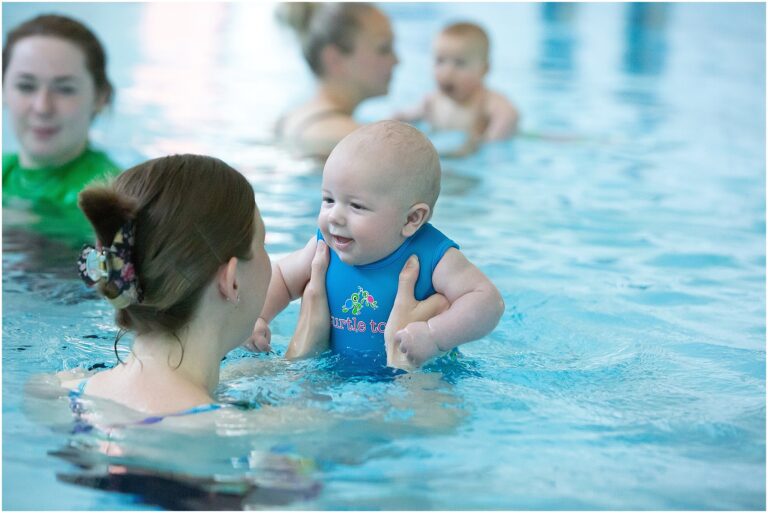The Therapeutic Power of Parent and Baby Swim Time for Mental Wellbeing

Connecting with your Baby through Swim Lessons
One of the ways that we as humans connect to one another, is through shared experience, and this is no different for mums, dads and babies. Swimming together offers precious time together, as you support your baby with their coordination, balance, and tend to their every emotion in the moment. This undivided attention and responsiveness to their emotions in the moment, from joy to shock to excitement – all contributes significantly to their emotional development. It can also be a welcome escape from the demands of modern life, and from emails, social media and instant messaging.
As you physically connect by guiding your baby through the water, you foster a deep trust between you and your baby. The physical contact can also stimulate the release of oxytocin, also known as the “love” or “cuddle” hormone, strengthening the emotional connection you share.
Water itself offers enormous sensory stimulation for your baby, which can be both exciting and soothing for them. Experiencing the feel of the water on their skin as they move their legs through the water, the splash as they hit the water from above, and the sight of bubbles, all contribute to your baby’s sensory development.
Regularly attending swimming lessons can offer routine and predictability for both parents and baby. This can be useful for your own stresses and anxieties, helping you to be a more patient, well-rounded parent at a time that you also need to engage in self-care and soothing or enjoyable activities.
Parent and baby swim time is so much more than just an enjoyable past time, it is time that deserves to be prioritised, and protected.
The Science Behind the Mental Health Benefits of Aquatic Activities
Water has been scientifically proven to have calming effects. When we are submerged in water, we are able to move our bodies in a way that reduces physical strain and protects our joints, as opposed to running on a treadmill for example. Swimming is also proven to improve lung capacity and endurance, to the extent that it can even reduce symptoms of asthma. Swimming will not only provide parents with such benefits, but will also help baby to develop strong lungs that may carry long-term health benefits.
The rhythmic nature of swimming; moving our arms and legs in the same fashion repeatedly, is also highly relaxing to our nervous system. It is a very mindful experience, allowing you to focus on the sensations within your body and your breathing, helping to reduce stress levels and anxiety. Not only does swimming provide the physical and psychological benefits of cardiovascular activity, but the slow, controlled breathing that we practice whilst swimming activates our parasympathetic nervous system – the “off-switch” to our stress response. This can be why we feel so sleepy after swimming – not only have we been working our bodies, but we are relaxed!
Water-based exercises and activities can also trigger the release of endorphins – our body’s natural painkillers and feel-good chemicals. This can help us to feel more positive and to feel a greater sense of wellbeing, which can be especially useful for parents who stereotypically put their needs last.
When swimming is done with others, such as during a parent and baby swimming lesson, all of these benefits multiply. Parent and baby swimming can become an activity to actively look forward to, helping to break up the week and improving your resilience during times of stress.
Combating Postpartum Challenges for Mums
After childbirth, many mums experience challenges with their mental health and well-being. Navigating significant changes in hormones, recovery from childbirth itself, adapting to the new baby, and adapting to changes in your sleeping patterns, eating habits; postnatal mental health difficulties are common – and understandable. Swimming has been shown to have benefits for mental health and wellbeing, including for mums with postnatal mental health difficulties.
Swimming with your baby can help to stimulate the production of oxytocin, a chemical associated with social bonding. This may be particularly important for mums who have been struggling to adapt to post-partum life or struggled with bonding. Swimming with other mums and babies by attending lessons can help to alleviate feelings of isolation, at a time that mums may be adapting to their new role as a parent. Feeling this sense of belonging to a community can be a powerful protective factor against poor mental health.
Feeling in tune with your baby and their differing facial expressions whilst swimming can improve self-esteem for mums. It can help improve confidence in your ability to understand your baby and meet their needs. This can be a great morale booster, and lift a mum’s mood and spirits.
The relaxing benefits of swimming don’t end with mums and dads either. The rhythmic movements of swimming, combined with processing their sensory experiences can help to relax babies. This can lead to babies developing better sleeping patterns, which in turn can support parent’s sleep and overall mood and wellbeing.
The physical and psychological benefits of swimming for mums, dads and babies cannot be overlooked. Modelling to your baby from such a young age that prioritising your mental and physical health is essential can help your baby to grow up with an awareness of their wellbeing, and being proactive in taking care of their own.
Share this post